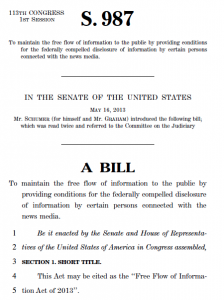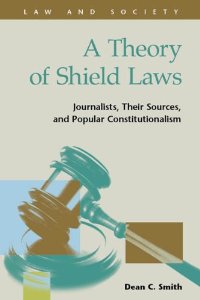Natasha Duarte contributed to this post.
The Senate Judiciary Committee is scheduled to meet with lawmakers today to discuss the federal reporter shield bill proposed by Senator Schumer (D-NY) in May of this year. Tune in to a live webcast of the meeting beginning at 10:00am.
The Free Flow of Information Act, S.987, includes some protection for reporters who are ordered to divulge confidential sources as part of a federal investigation. The public push for a federal shield law has gained traction over recent months as the public reacted to governmental invasions into journalist organizations like the Associated Press.
Although the bill seems to be a positive step towards granting journalists protection, critics have noted one troublesome section of the bill that limits the definition of who constitutes a “journalist” or a “covered person.” Senator Dianne Feinstein (D-Calif.) has proposed an amendment to S.987 that would limit the classification of a journalist to a salaried agent of an organization that “disseminates news or information.”
The Electronic Frontier Foundation outlined Feinstein’s proposed amendments to the definition of ”covered person”:
- A person working as a “salaried employee, independent contractor, or agent of an entity that disseminates news or information;”
- either (a) meeting the prior definition “for any continuous three-month period within the two years prior to the relevant date” or (b) having “substantially contributed, as an author, editor, photographer, or producer, to a significant number of articles, stories, programs, or publications by an entity . . . within two years prior to the relevant date;” or
- working as a student journalist “participating in a journalistic publication at an institution of higher education.”
Senator Feinstein cites a need to limit the bill’s protection from including those “who aren’t really reporters at all, who have no professional qualifications” and says she believes the bill should be applied to “real reporters.”
Critics of the proposed amendments have argued that a narrow definition of what it means to be a journalist doesn’t fit the ever-evolving model of reporting. Technological developments over the last two decades have resulted in a shift away from the traditional definition of what it means to be a “journalist.” Reporting is increasingly being done by citizen journalists, bloggers, and independent reporters who are not employed by traditional media outlets.
This model will no doubt continue to evolve along with new technology. Critics of the bill suggest that reporting is an act rather than a status and that those engaged in reporting should be protected from having to reveal their confidential sources regardless of medium, employer, or salary.



 This week, the Appellate Division of the New York Supreme Court affirmed a decision by a lower court that a Fox News reporter must comply with a Colorado subpoena to testify as a witness — and possibly divulge her confidential sources — in the criminal trial against James Holmes, the alleged gunman of the Colorado movie theater shooting.
This week, the Appellate Division of the New York Supreme Court affirmed a decision by a lower court that a Fox News reporter must comply with a Colorado subpoena to testify as a witness — and possibly divulge her confidential sources — in the criminal trial against James Holmes, the alleged gunman of the Colorado movie theater shooting.